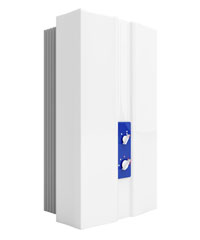tulsa tankless - water heaters
The tankless water heater represents the most major advance in residential water heating since the first storage-tank model was invented in 1899. A tankless model generates hot water entirely on-demand. This eliminates many of the limitations of the traditional storage tank heater and improves energy-efficiency. As the typical American household spends about $500 annually on water heating, any cost savings can make a difference in the family budget. Here are some ways a tankless water heater improves both convenience and economy in your home.
No standby heat loss. A typical conventional water heater utilizes a tank to store about 50 gallons of hot water. As time passes, water in the tank gradually cools, and the burner must activate to maintain proper water temperature. Due to this standby heat loss, energy is wasted reheating water in the tank multiple times until the water is finally used. Instead of storing water, a tankless unit heats only when hot water is needed.
Unlimited hot water. When someone opens a hot water tap in the house, a tankless unit senses the requirement and instantly begins heating the continuous flow of water for as long as required. You never run out of hot water like you do with a storage-tank unit when demand is high. Nobody ends up shivering in a cold shower.
Longer service life. The tank is a weak link in a storage-tank water heater. After an average service life of about 12 years, standard water-heater tanks are subject to internal corrosion, mineral accumulation, and leakage that require replacement of the entire unit. Tankless units eliminate these downsides and, with proper maintenance, will usually last more than 20 years.
Improved energy efficiency and lower costs. In a home that uses up to 40 gallons of hot water daily, tankless heaters are about 30% more energy-efficient than a conventional tank model. According to the EPA, a tankless heater with Energy Star certification can reduce hot water costs by $100 per year in the typical household.
More Benefits Of tulsa Tankless Water Heaters
Not only will a tankless heater save you money on your energy bills, it will also save space within your home since these systems do not require large holding tanks like their traditional counterparts do. This can free up some space in your basement for extra storage, or a kid’s play area.
Another feature that makes these new, more modern heaters very popular is the fact that it is virtually impossible to run out of hot water. It only takes a few consecutive showers to deplete a traditional heater’s tank. Afterwards, it is necessary to wait until the tank’s contents are heated once again before you can access hot water. With a tankless system, the supply is continuous and plentiful.
Tankless Water Heater Installation
The proper installation of a tankless water heater is very important for it to run efficiently and perform as it is designed to do. There are many aspects to properly installing a tankless water heater and you should hire Air Assurance’s professional plumbers to complete the installation.
To properly install a tankless water heater, Air Assurance will first check the gas line. A tankless water heater will typically require a gas line with a larger diameter. There is a little electrical wiring involved as well, and once the old water heater is removed and disconnected, we can begin setup of the new water heater. Tankless water heaters are mounted to the wall, not left on the floor like a conventional water heater.
For more about the efficiency and performance benefits of a tankless water heater, contact Air Assurance.





